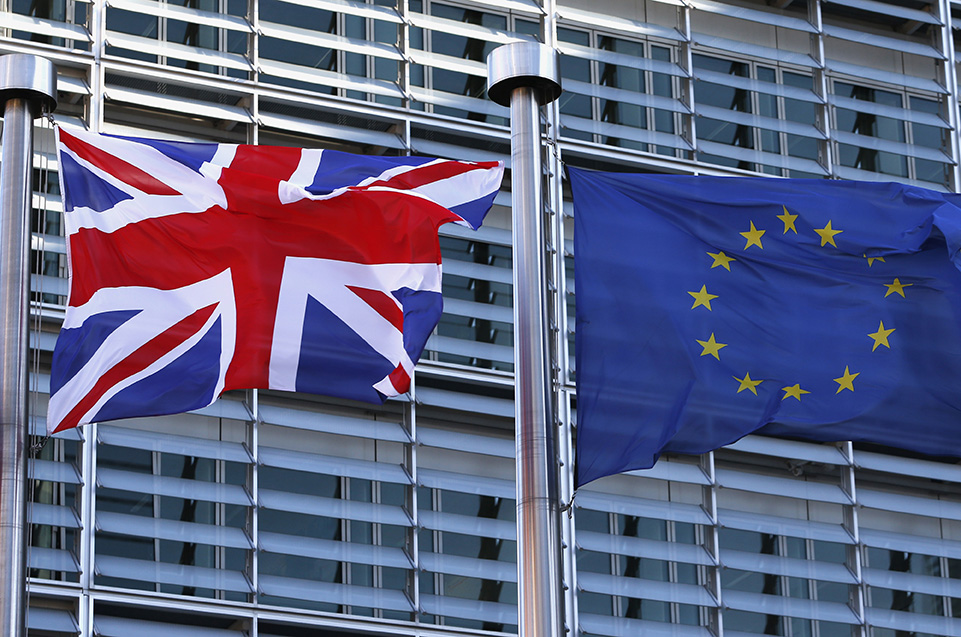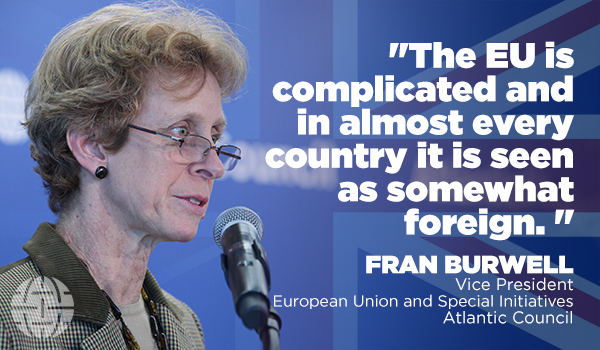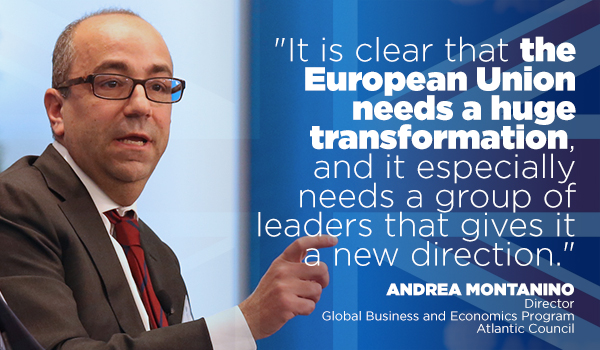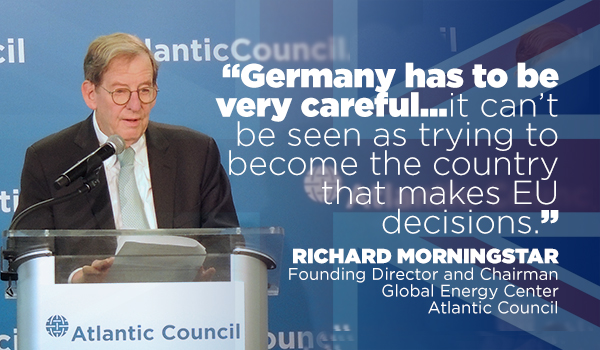
Atlantic Council experts discuss what Brussels needs to do differently
British voters will take part in a referendum on June 23 to decide whether the United Kingdom should remain in the European Union. Latest polls show a close race.
For months, proponents and opponents of the so-called Brexit have made their case to the British public.
Opponents, led by British Prime Minister David Cameron, warn that a serious economic crisis that would befall the United Kingdom if it were to leave the EU. Cameron has even compared his quest to keep the United Kingdom in the EU to Winston Churchill’s decision to fight Adolf Hitler.
Advocates of leaving, among them London’s former mayor Boris Johnson, say the United Kingdom must be in charge of its own destiny. They also say leaving the EU is vital to protecting British identity and culture—an argument that is often tied to opposition to immigration.
The United Kingdom and the United States share a so-called special relationship. The United Kingdom’s departure from the European bloc would deprive Washington of a friend at the table in Brussels. A Brexit could also have serious consequences for US businesses. The anxiety felt in Washington over a possible Brexit was underscored when US President Barack Obama uncharacteristically weighed in on the matter on a visit to London in April earlier this year.
“The European Union doesn’t moderate British influence,” Obama wrote in the Telegraph. “It magnifies it.”
And, he added: “The United States sees how your powerful voice in Europe ensures that Europe takes a strong stance in the world, and keeps the EU open, outward looking, and closely linked to its allies on the other side of the Atlantic.”
The debate within the United Kingdom has been heated and turned deadly on June 16 when Jo Cox, a Labour Member of Parliament who had campaigned for the United Kingdom remaining in the EU or Bremain, was killed by a lone assailant with politically far-right leanings.
Regardless of the outcome of the vote, the EU will need to undertake significant reform. We asked our experts to tell us what the EU needs to do differently in light of the referendum. This is what they had to say:
Fran Burwell is vice president, European Union and Special Initiatives, at the Atlantic Council. Follow her on Twitter @FranBurwell.
There are two things that the EU needs to do to change. First, it needs to make its own workings more transparent to its citizens and more connected with their national politics. The Union, and particularly the Juncker Commission, has tried to pick some things where they can make a real difference to people’s lives. For example, mobile roaming rates are going down this year. In discussions on the digital single market there has been a lot of talk about how it costs different amounts to ship packages when you buy something online and that you should be able to watch the movies you’ve paid for in your home country when you’re in a different European country on vacation.
But it has to be bigger than that. It has to be more about remembering why we have the EU and ensuring that there is more of a sense that citizens have a say in what the EU is deciding. In reality, they do have a say through the European parliament, which is directly elected by European publics in each member state. But few people really understand that. There is a fairly low turnout in these elections—usually only between 35-42 percent—although the turnout is equivalent to US congressional elections when there is not a presidential election. Because the European Parliament election is not taken that seriously, it is too easy for people use their vote as a protest, voting against their national government and sometimes for anti-establishment parties.
The second thing that needs to happen is that member states need to stop blaming Brussels for everything. They go to Brussels knowing that they have to make decisions on hard issues, but they don’t want to take the political costs themselves and so they blame Brussels, just as we in the United States often blame Washington, only perhaps a bit more so. The public needs to understand that Brussels is not some foreign place, but rather a place where their government works with others to make decisions.
In reality, the democratic deficit in the EU is not as much as it is often claimed. But in terms of perception, there is a very real sense that there is not adequate democracy in the EU. Correcting this perception and encouraging citizens to engage with the EU is one of the big challenges facing the Union in the future.
Q: Why is there that lack of perception?
Burwell: The EU is complicated and in almost every country it is seen as somewhat foreign. There is a lot of agreement about the good things like “we want to be able traverse borders without showing our ID cards,” “we want to be able to go to school in universities across Europe,” “we want to be able to use one currency when we travel across most of Europe,” and “we want Europe to do more in terms of fighting terrorism and police coordination.”
Like with any political body, the citizens want certain things, but they don’t always want all the associated consequences. Sometimes the EU is too specific and rigid in terms of its regulatory policy. There are some ridiculous examples of things that the EU regulates or wants to regulate. But to be fair, sometimes national governments decide to implement regulations very strictly and then blame Brussels. Overcoming this perception of the EU is going to take a long time.
Britain is a particularly challenging case because the media there, particularly the tabloid media, has been so anti-EU for so long that the public can be forgiven for automatically seeing the negative elements of the EU.

Q: In the event of a Brexit, is the onus on Germany to champion reforms within the EU?
Burwell: It is going to be very difficult for Germany. It will be looked to as the strongest leader, especially since France is economically weak right now and has its own internal political struggles with its president being weak within his own political party.
It is made even more challenging by the current Polish government’s view that it is less of a player in Europe and more of a regional player. The Polish government is putting its energies more into building a regional framework rather than reaching out to Brussels as much.
A few years ago, when I would visit Germany during the Eurozone crisis and ask whether Germany could be both an economic and a foreign policy and political leader of Europe, the consensus was “not at the same time.” But Germany has been forced to pick up that role more and more as the British have been absorbed by their own domestic debate. Post-Brexit, this could become a permanent state of affairs unless we see other countries step forward.
Andrea Montanino is the director of the Global Business and Economics Program at the Atlantic Council. He was formerly executive director of the International Monetary Fund representing the governments of Italy, Albania, Greece, Malta, Portugal, and San Marino. Follow him on Twitter @MontaninoUSA.
Whatever the result, it is clear that the European Union needs a huge transformation, and it especially needs a group of leaders that gives it a new direction. I would like to see on the day after the referendum the leaders of EU member states meeting in Brussels and taking a number of decisions that will deepen the Union.
First, they should pass a law to abolish most of the regulations that exist—a huge simplification of the approach. Just to give an example, the EU came out with a regulation that Italian fishermen cannot use a certain safe product to brighten mussels. There is a regulation at the EU level that controls brightening of mussels!
Second, European leaders must decide that by the end of this year there will be a Capital Markets Union and the Digital Single Market. These are two elements that can make European companies more competitive and bring more financial resources to startups.
Third, there should be a decision to have euro bonds—a new bond issued by a European agency—to finance the migrant crisis.
Fourth, the leaders need to provide a mandate to the European Stability Mechanism to prepare and issue euro bonds for growth—euro bonds targeted for human capital, infrastructure, and research and development. These euro bonds can be a European issuance of debt up to five percent of European GDP, which means 700 billion euros that you can inject into the European economy and show that European institutions are doing something concrete to create jobs. Given the current interest rates, this can be a debt easily issued at a rate that is less than one percent, a ten-year bond in an amount that will not crowd out other issuances of debt by member states.
And fifth, European leaders should decide to increase the European budget from the current one percent of GDP to three percent of GDP.
Q: Is the EU considering any of these measures?
Montanino: No. There is huge opposition from Germany on things like issuing euro bonds and increasing the European budget, and there is also a lot of anti-European sentiment among the publics.

Q: In the event of a Brexit, do you see a more complicated relationship between Germany and the other EU member states?
Montanino: Germany is clearly the most powerful country in Europe by far. It has always been the biggest economy, but now the gap with the others is really impressive. [It’s relationships] will depend very much on how Germany behaves. If its leadership understands that they are called by history to play a certain role to deepen the European Union and they do it in an inclusive way, then it can be a very helpful relationship.
Richard L. Morningstar is the founding director and chairman of the Global Energy Center at the Atlantic Council and a former US ambassador to the EU.
Whether Brexit or Bremain prevails, the EU has to recognize that it has many issues that it needs to face. There is much dissatisfaction in many countries with policies coming out of Brussels and with the level of transparency with which Brussels operates.
Brussels needs to think a lot about how it can refine its policies to better relate to the concerns of the average citizen. It should be a long time before Brussels takes as a lesson that it needs to become more federal. That would be very difficult, at least over the next couple of years.
Brussels needs to address specific problems like its fiscal and monetary policies, whether austerity makes the most sense in certain countries, and how the migration issues will be addressed. One way or the other, the EU has to gain the confidence of the populace.
In the case of Britain, if Britain votes to remain it needs to take from it that it should assume an even greater leadership role within the EU. Britain should recognize the concerns of its citizens, even if they do vote by a narrow margin to remain in the EU, and take from it that it should have a leadership role in foreign and migration policies, and overall EU economic policies.
Q: Given the prevailing climate in Europe—especially challenges related to the economy and migration—is there political space for Brussels to undertake reforms?
Morningstar: There may be pushback from some governments. There is very limited bandwidth to do anything that would require changes in the treaties. The worst thing that could happen now within the EU is that there be referenda in other member states on important issues. The EU traditionally has not done very well on referenda and it would be in a particularly weak state now. The immediate action that Brussels has to take is to work through migration, fiscal, and monetary policies that make sense and could create more confidence among EU citizens.

Q: What role do you expect Germany to play in the EU should the United Kingdom decide to leave?
Morningstar: Germany has to be very careful. It is a large country with a strong economy, but it can’t be seen as trying to become the country that makes EU decisions. It needs to work to gain cooperation, not just among larger countries such as France, but among all the member states and particularly among states in central, eastern, and southern Europe.
Ashish Kumar Sen is deputy director, editorial, at the Atlantic Council. You can follow him on Twitter @AshishSen.
Image: A Union Jack flag flutters next to a European Union flag at the EU Commission headquarters in Brussels. British voters will take part in a referendum on June 23 to decide whether the United Kingdom should leave the EU. (Reuters/Yves Herman)
